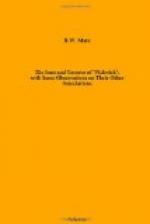In an old engraving of Rochester Bridge the inn can be seen with the word “Wright’s” distinctly showing in prominent letters emblazoned on its frontage, if such proof that Jingle was not romancing were necessary.
The inn was rebuilt in 1864, and has been identified as the “Crozier” of Edwin Drood, where Datchery, on his first arrival in the town “announced himself . . . as an idle dog living on his means . . . as he stood with his back to the empty fire-place, waiting for his fried sole, veal cutlet and pint of sherry.”
In the meantime Mr. Pickwick and his friends, after having engaged and inspected a private sitting-room and bedrooms and ordered their dinner at “The Bull,” set out to inspect the city and adjoining neighbourhood.
Before the days of Pickwick, the “Bull” presumably was merely a comfortable roadside coaching inn between Dover and London, with no claim to fame other than that of being a favoured resort of the military from the adjacent town of Chatham. It is true that Queen Victoria—then but a Princess—was compelled, because of a mishap to the bridge across the Medway and the stormy weather, to stay in the inn with her mother, the Duchess of Kent, for one night only. They were on their way to London from Dover. The event happened on the 29th of November, 1836, and caused a flutter of excitement in the city and inspired the proprietor to add the words “Royal Victoria” to the inn’s name, and to justify the adornment of the front of the building with the royal crest of arms.
But it remained for the Pickwickians to draw the inn out from the ruck of the commonplace, and to spread its fame to all corners of the globe; and the fact that it once had royal patronage is nothing in comparison to the other fact that it was the headquarters of the Pickwickians on a certain memorable occasion. That is the attraction to it; that is the immutable thing that makes its name a household word wherever the English language is spoken. Indeed, that was the one notable event in its history which filled the proprietor with pride, and in his wisdom, in order to lure visitors into its comfortable interior, he could find no more magnetic announcement for the signboard on each side of the entrance than the plain unvarnished statement: “Good House. Nice Beds. Vide Pickwick.”
[illustration: The Bull Hotel, Rochester. From a photograph by T.W.Tyrrell]
It may have boasted a history before then: it is difficult to say. It existed in 1827 when Dickens housed the famous four within its hospitable walls; and he doubtless knew it long before then when, as a lad, he lived in Chatham; anyway, it was always a favourite of his, and furnishes the scene of many incidents in his books, in addition to the part it plays in the early portion of The Pickwick Papers; it no doubt is the original of the “Winglebury Arms” in “The Great Winglebury Duel” in Sketches by Boz, and is certainly the “Blue Boar” of Great Expectations.




